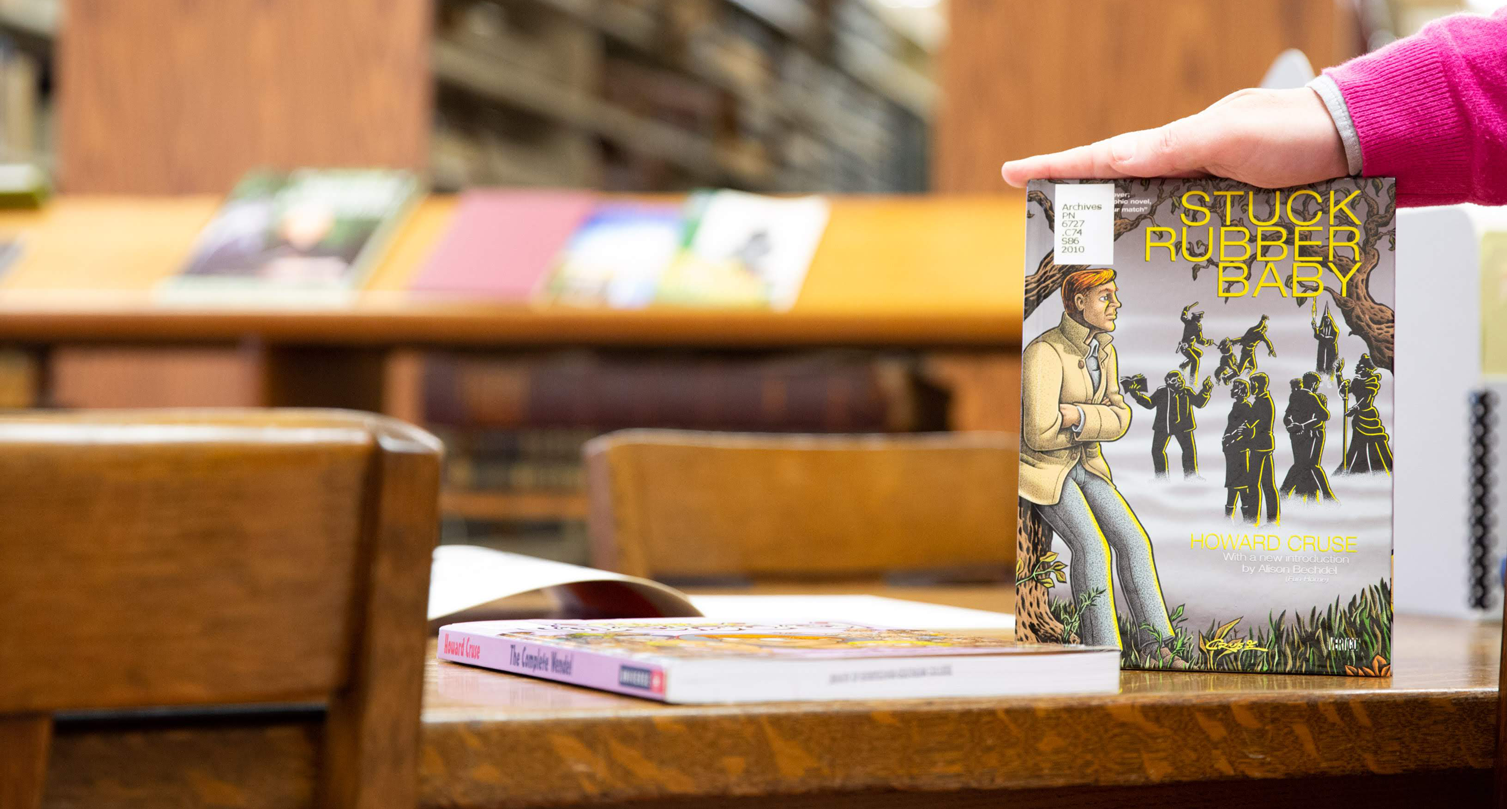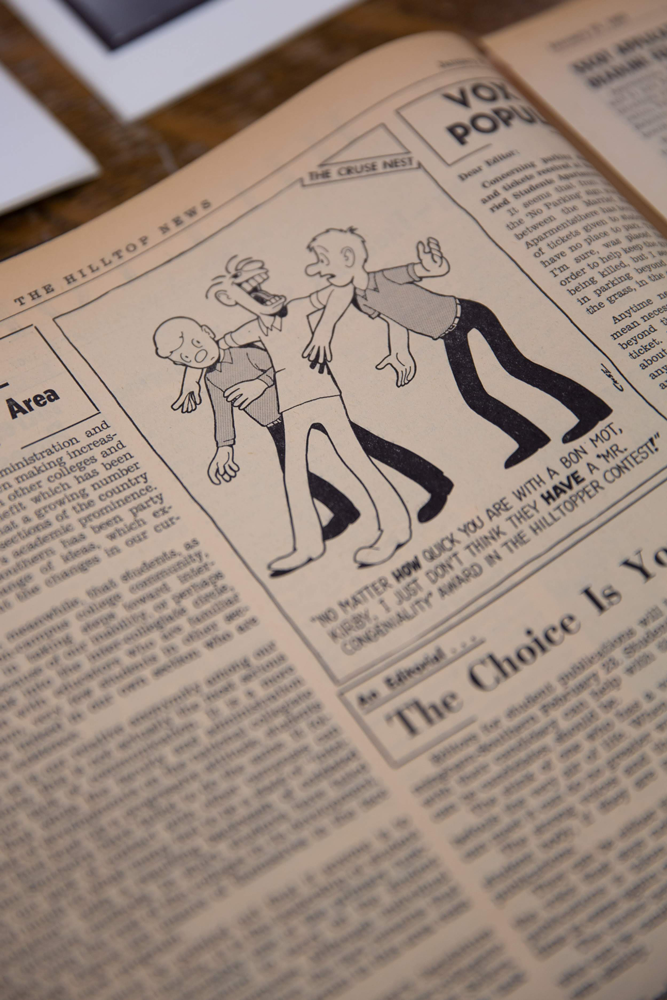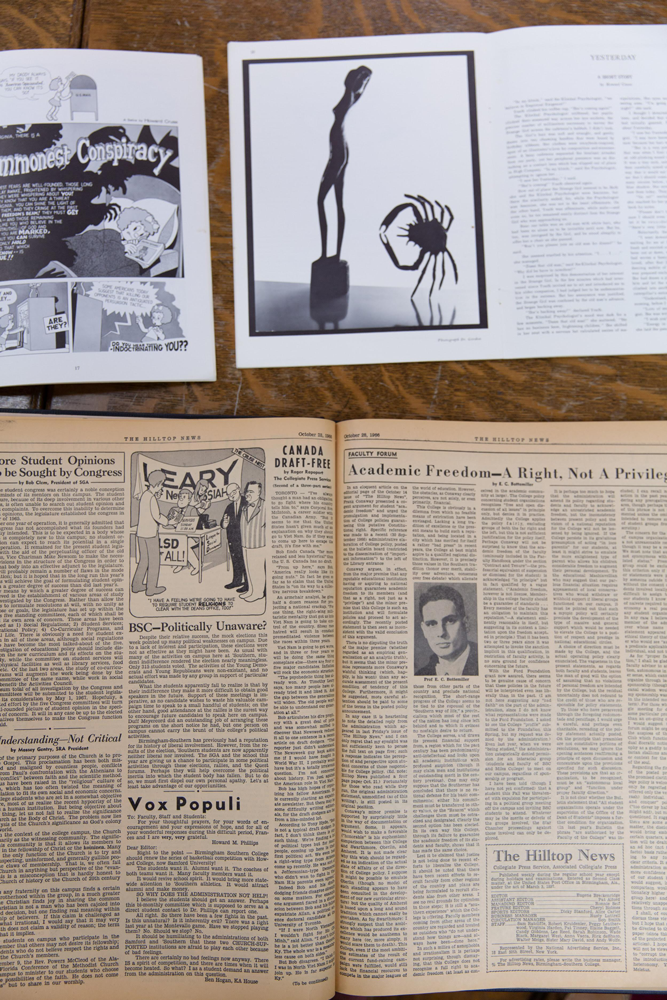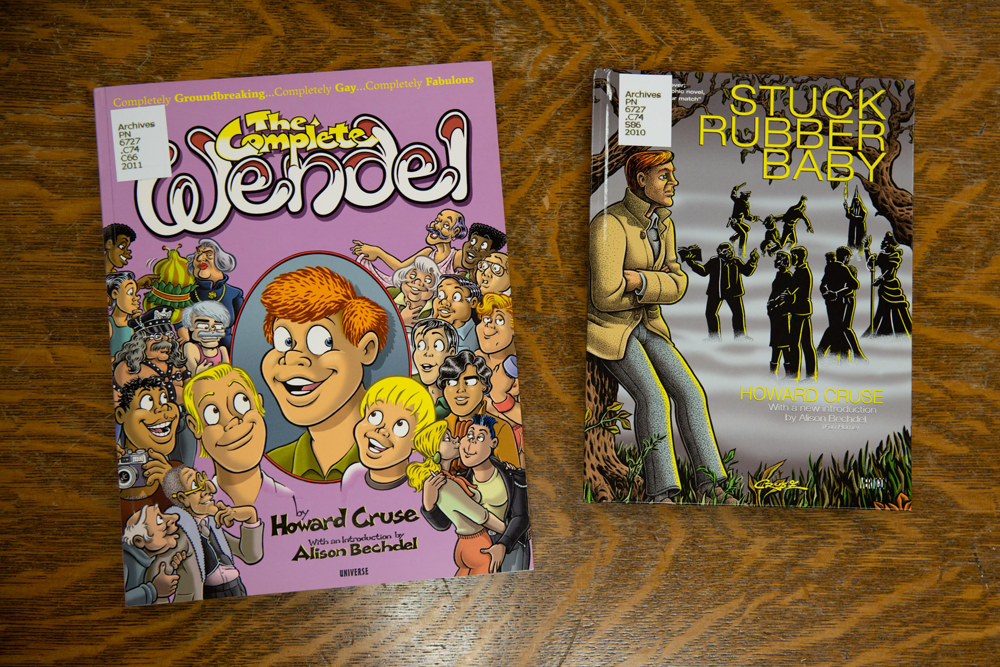
A “Cruse” through BSC’s past
A “Cruse” through BSC’s past
Digital collection highlights early works of influential artist Howard Cruse ’68
It feels like the cartoons in the Hilltop News were a sign of what was to come.
 In a series of panels that ran in Birmingham-Southern College’s student newspaper, Howard Cruse ’68 lampooned everything from crowded dorm conditions to the honor code to fraternity stereotypes.
In a series of panels that ran in Birmingham-Southern College’s student newspaper, Howard Cruse ’68 lampooned everything from crowded dorm conditions to the honor code to fraternity stereotypes.
Cruse went on to a career as an alternative cartoonist and has been lauded as “the father of gay comics.” His graphic novel Stuck Rubber Baby and comic strip Wendel broke boundaries and inspired a generation of LGBTQ+ artists.
And now, thanks to Prof. Gina K. Armstrong ’92, BSC Archivist and Digital Initiatives Librarian, creative work from his time at BSC is available in a digital collection online.
“While putting together another collection about the theatre at BSC, I kept coming across Cruse’s name in a variety of work, so I decided to feature him in our next collection. He is so seminal and we have done nothing in the past to promote his connection to BSC because of his gay identity,” said Armstrong, who pushed the school to be more welcoming to LGBTQ+ students while at BSC as an undergrad. “His Golden Ginkgo year seemed like a fantastic opportunity to showcase his work and acknowledge him.”
The collection includes a series of single panels called “Cruse Nest” that ran in the Hilltop News for most of the 1966-67 academic year. It also covers illustrations he drew while on the staff of the 1964 Southern Accent yearbook; issues of Granny Take a Trip, an underground newspaper Cruse created and ran with Julie Brumlik ’68; creative writing that appeared in QUAD; and his playbills and set designs for BSC theatre productions.
The online archive also shares the story of a The Sixth Story, a play that Cruse, a theatre major, wrote that was workshopped during BSC’s 1967-68 drama season and helped him get into graduate school at Pennsylvania State University as a playwright, a path he abandoned to explore other creative outlets.
In fact, it was theatre that drew Cruse to Birmingham-Southern. While the Springville, Ala. native was in high school at the Indian Springs School, he was drawing cartoons and immersed in theatre; his boarding school roommate was the son of Joseph Hugh Thomas ’33, who was chair of BSC’s Music Department from 1964-72.
 “I was really fascinated by musicals, and when I learned he was writing the music for a musical comedy, I was thrilled to be that close to someone who was doing something so creative,” said Cruse. “After that I went to pretty much every College Theatre play and the presence of both those two on campus was a big incentive to take the school seriously.”
“I was really fascinated by musicals, and when I learned he was writing the music for a musical comedy, I was thrilled to be that close to someone who was doing something so creative,” said Cruse. “After that I went to pretty much every College Theatre play and the presence of both those two on campus was a big incentive to take the school seriously.”
Cruse said Thomas and theatre director and professor of English, drama, and speech Dr. Arnold Frances Powell drew him to Birmingham-Southern, despite the fact that BSC didn’t even have a drama major at the time. He tried other options, including math, art, and English, before the theatre major was added and he found his true home.
“But I also had some other courses that were exceptional, some were unlikely courses for me to be enthusiastic about,” Cruse said, listing Dr. Earl Gossett’s “Introduction to Christianity,” Dr. Edward Bottemiller’s “Philosophy 101” course, and classes from history professor Dr. Henry Clay Randall.
While he remembers BSC fondly, he was also sometimes at odds with the administration and the dominant culture of the time. For example, the library’s files include “The Commonest Conspiracy,” a multi-page satirical comic that appeared in the 1967 issue of the campus literary magazine QUAD and raised such apprehension in the mind of the publication’s faculty advisor that he insisted on preceding the comic with a warning statement. Also in 1967, he stopped drawing his Hilltop News strip in March, citing issues of academic freedom.
After Birmingham-Southern, Cruse’s work started getting attention in the world of underground comics in the 1970s; in 1979, he began editing Gay Comix, an anthology featuring the work of openly LGBTQ+ artists. In the 1980s, he published a regular strip called Wendel in the national gay newsmagazine The Advocate. In it, he presented a realistic view of the gay rights movement, the AIDS epidemic, same-gender relationships, and more.

The work is so significant it has been reprinted with a foreword by cartoonist and McArthur “Genius” Award winner Alison Bechdel, who credits him as one of her influencers. Playwright Tony Kushner, who wrote an introduction to his book Stuck Rubber Baby, called Cruse “a pioneer” in the field.
That graphic novel, which tells the story of a young man coming to grips with his own homosexuality and societal racism in the South in the 1960s, includes stretches set at the remarkably familiar looking “West Hills College.” (Cruse has said that the main character’s name, Ginger Raines, was a hat tip to his BSC friend Howell Raines ’64.) Birmingham-Southern doesn’t have permission to republish images from the book, but you can see glimpses of the college’s architecture on Cruse’s website here and here.
“I snuck onto campus to take pictures for photo-reference," Cruse mentions with a laugh.
While the bulk of Cruse’s personal and professional papers reside in the graphic novels collection at the Columbia University Rare Book & Manuscript Library, Armstrong – who travelled to Columbia and have added some works housed there from the same era to BSC’s collection -- said it’s a thrill to be able to showcase his work that’s connected to BSC. Cruse himself also contributed to the digital conversation, both adding materials and giving insight to Armstrong as they put it together. Cruse himself also contributed to the digital conversation, both adding materials and giving insight to Armstrong as she put it together.
But Cruse, for his part, points out his many classmates and theatre peers who have also found artistic success off the Hilltop.
“I have really appreciated this attention but I’m aware that there are lots of other people out there who are also deserving,” he said.
That may be the case, but Cruse, for one, is well overdue the recognition. You can see the digital collection here.

